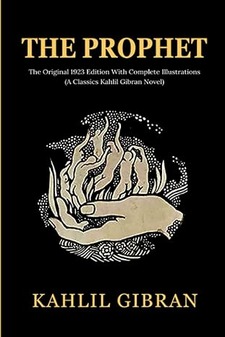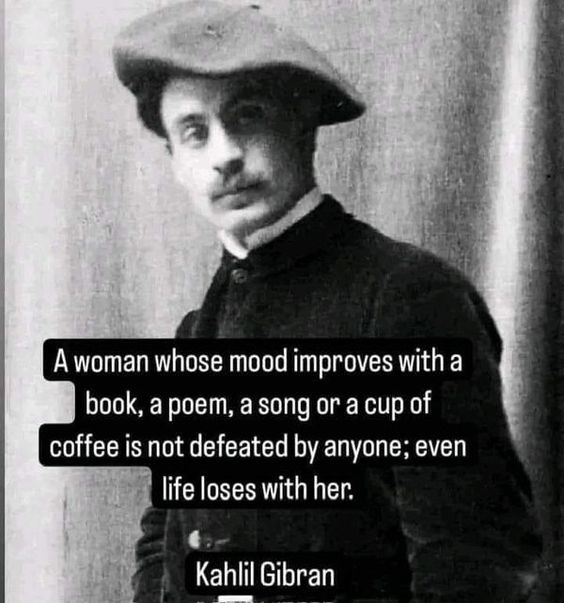“But you do not see, nor do you hear, and it is well.
Kahlil Gibran, The Prophet (Page 87)
The veil that clouds your eyes shall be lifted by the hands that wove it,
And the clay that fills your ears shall be pierced by those fingers that kneaded it. And you shall see.
And you shall hear.
Yet you shall not deplore having known blindness, nor regret having been deaf.
For in that day you shall know the hidden purposes in all things,
And you shall bless darkness as you would bless light.”
“You have been told that, even like a chain, you are as weak as your weakest link.
Kahlil Gibran, The Prophet (Page 82)
This is but half the truth. You are also as strong as your strongest link.
To measure you by your smallest deed is to reckon the power of ocean by the frailty of its foam.
To judge you by your failures is to cast blame upon the seasons for their inconstancy.”
“And now you ask in your heart, ‘How shall we distinguish that which is good in pleasure from that which is not good?’
Kahlil Gibran, The Prophet (Page 69)
Go to your fields and your gardens, and you shall learn that it is the pleasure of the bee to gather honey of the flower,
But it is also the pleasure of the flower to yield its honey to the bee.
For to the bee a flower is a fountain of life,
And to the flower a bee is a messenger of love,
And to both, bee and flower, the giving and the receiving of pleasure is a need and an ecstasy.”
“You pray in your distress and in your need; would that you might pray also in the fullness of your joy and in your days of abundance.
Kahlil Gibran, The Prophet (Page 64)
For what is prayer but the expansion of yourself into the living ether? And if it is for your comfort to pour your darkness into space, it is also for your delight to pour forth the dawning of your heart.”
“When you part from your friend, you grieve not;
Kahlil Gibran, The Prophet (Page 56)
For that which you love most in him may be clearer in his absence, as the mountain to the climber is clearer from the plain. And let there be no purpose in friendship save the deepening of the spirit.”
“No man can reveal to you aught but that which already lies half asleep in the dawning of your knowledge.
Kahlil Gibran, The Prophet (Page 53)
The teacher who walks in the shadow of the temple, among his followers, gives not of his wisdom but rather of his faith and his lovingness.
If he is indeed wise he does not bid you enter the house of his wisdom, but rather leads you to the threshold of your own mind.”
“Your reason and your passion are the rudder and the sails of your seafaring soul.
Kahlil Gibran, The Prophet (Page 47)
If either your sails or your rudder be broken, you can but toss and drift, or else be held at a standstill in mid-seas. For reason, ruling alone, is a force confining; and passion, unattended, is a flame that burns to its own destruction.
Therefore let your soul exalt your reason to the height of passion, that it may sing;
And let it direct your passion with reason, that your passion may live through its own daily resurrection, and like the phoenix rise above its own ashes.”
“You shall be free indeed when your days are not without a care nor your nights without a want and a grief,
Kahlil Gibran, The Prophet (Page 43)
But rather when these things girdle your life and yet you rise above them naked and unbound.”
“The lust for comfort murders the passion of the soul, and then walks grinning in the funeral.”
Kahlil Gibran, The Prophet (Page 30)
“The deeper that sorrow carves into your being, the more joy you can contain.”
Kahlil Gibran, The Prophet (Page 27)
“Work is love made visible.
Kahlil Gibran, The Prophet (Page 26)
And if you cannot work with love but only with distaste, it is better that you should leave your work and sit at the gate of the temple and take alms of those who work with joy.
For if you bake bread with indifference, you bake a bitter bread that feeds but half man’s hunger.
And if you grudge the crushing of the grapes, your grudge distils a poison in the wine. And if you sing though as angels, and love not the singing, you muffle man’s ears to the voices of the day and the voices of the night.”
“The wind speaks not more sweetly to the giant oaks than to the least of all the blades of grass;
Kahlil Gibran, The Prophet (Page 26)
And he alone is great who turns the voice of the wind into a song made sweeter by his own loving.”
“There are those who give little of the much which they have—and they give it for recognition and their hidden desire makes their gifts unwholesome.
Kahlil Gibran, The Prophet (Page 18)
And there are those who have little and give it all.
These are the believers in life and the bounty of life, and their coffer is never empty.”
“You give but little when you give of your possessions.
Kahlil Gibran, The Prophet (Page 18)
It is when you give of yourself that you truly give.”
“Your children are not your children.
Kahlil Gibran, The Prophet (Page 15)
They are the sons and daughters of Life’s longing for itself.
They come through you but not from you,
And though they are with you yet they belong not to you.
You may give them your love but not your thoughts,
For they have their own thoughts.
You may house their bodies but not their souls,
For their souls dwell in the house of tomorrow, which you cannot visit, not even in your dreams.
You may strive to be like them, but seek not to make them like you. For life goes not backward nor tarries with yesterday.
You are the bows from which your children as living arrows are sent forth.”
“Love one another, but make not a bond of love:
Kahlil Gibran, The Prophet (Page 13)
Let it rather be a moving sea between the shores of your souls.
Fill each other’s cup but drink not from one cup.
Give one another of your bread but eat not from the same oaf. Sing and dance together and be joyous, but let each one of you be alone,
Even as the strings of a lute are alone though they quiver with the same music.
Give your hearts, but not into each other’s keeping.
For only the hand of Life can contain your hearts.”
“Love has no other desire but to fulfill itself.
Kahlil Gibran, The Prophet (Page 10)
But if you love and must needs have desires, let these be your desires:
To melt and be like a running brook that sings its melody to the night. To know the pain of too much tenderness
To be wounded by your own understanding of love;
And to bleed willingly and joyfully.
To wake at dawn with a winged heart and give thanks for another day of loving;
To rest at the noon hour and meditate love’s ecstacy;
To return home at eventide with gratitude;
And then to sleep with a prayer for the beloved in your heart and a song of praise upon your lips.”
“Love gives naught but itself and takes naught but from itself.
Kahlil Gibran, The Prophet (Page 9)
Love possesses not nor would it be possessed;
For love is sufficient unto love.”
The Prophet [Book]

Book Overview: Kahlil Gibran’s masterpiece, The Prophet, is one of the most beloved classics of our time. The Prophet has been translated into over 100 different languages, making it one of the most translated books in history and the American editions alone have sold more than nine million copies. The Prophet is a collection of poetic essays that are philosophical, spiritual, and, above all, inspirational. Gibran’s musings are divided into twenty-eight chapters covering such sprawling topics as love, marriage, children, giving, eating and drinking, work, joy and sorrow, housing, clothes, buying and selling, crime and punishment, laws, freedom, reason and passion, pain, self-knowledge, teaching, friendship, talking, time, good and evil, prayer, pleasure, beauty, religion, and death.
Post(s) Inspired by this Book:
